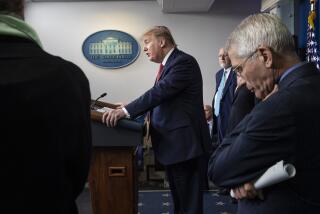Congress Has Yet to Kick the Habit
- Share via
WASHINGTON — When Rep. Charlie Norwood was diagnosed with a chronic lung disease a few years back, he followed the orders of his wife, Gloria, and gave up red meat, chewing tobacco and his favorite cigars.
But that didn’t save the Georgia Republican -- recently recovered from a lung transplant and hooked up to an oxygen tank -- from landing in a shroud of cigarette smoke recently as he parked his scooter chair in the Speaker’s Lobby outside the House floor.
Norwood doesn’t smoke anymore, but several of his congressional colleagues do, defiantly and unapologetically, making the U.S. Congress one of the few and possibly the most famous indoor workplaces in the country where it’s still legal to light up.
The District of Columbia City Council passed a law that will make indoor work sites, bars and restaurants smoke-free by January. The notable exception is Congress, where tobacco leaves dot the frescoes, and knee-high ashtrays stand sentry outside the House chamber.
And it’s not likely to change anytime soon, given that newly elected House Majority Leader John A. Boehner (R-Ohio) is a chain smoker who takes morning exercise walks, then drags on his brand of choice -- Barclay. Rep. Tom DeLay of Texas, his predecessor, has been spotted spitting Skoal into a cup on the House floor.
It’s not that smoking on the Hill hasn’t been restricted over the years. Once, they puffed away with abandon. Today, they limit themselves to certain areas -- in their offices, the Rayburn Building cafeteria and, most notoriously, the ornate, redcarpeted Speaker’s Lobby, where the news media and lobbyists buttonhole members passing through to vote.
That’s where Norwood was caught in the cloud that an aide says he didn’t complain about, but where a lighted cigarette passed so close to his oxygen tank, one observer worried the whole place might go up.
“I can’t go in there. If I have to go in, I have to get out. It’s very unfair,” Rep. Henry A. Waxman, a Los Angeles Democrat and crusader for nonsmokers’ rights, recently complained.
Nonsmokers at the Capitol have tried -- bureaucratically and creatively -- to banish tobacco from this historic place. Requests to do so are routinely ignored. A few years back, someone tried stealing the ashtrays -- the big heavy ones filled with sand. Learning that cigarettes were sold from unregulated vending machines and in congressional snack shops (at a reduced price, no less), Waxman staged a sting, arranging for underage customers to buy them, which they did.
Waxman recently requested an investigation into why Congress isn’t made to comply with the laws that govern much of the rest of country. Americans, as a whole, have sided with nonsmokers. A dozen states, California included, have passed smoke-free air laws; so have many individual cities. Indeed, Majority Leader Boehner cannot smoke in businesses in Columbus, his home state’s capital.
Flouting its host city’s new smoking ban could enhance the impression that Congress holds itself above its citizenry. It is immune from the Freedom of Information Act and many federal civil rights and labor laws. It can vote itself raises even if the economy tanks, has health insurance while as many as 46 million Americans go without, and its members soon will be free to puff away in their congressional digs while the rest of Washington’s smoking public is forced out into the cold.
In the Rayburn cafeteria last week, Fanny Arnaud and Sara Jordan sat in its hazy back section because the nonsmoking section had filled up.
“I don’t like it, but there’s nowhere else to sit,” Jordan said.
A couple of tables away, Nancy Homan, 74, felt like she was getting away with something. A Schenectady, N.Y., resident and a smoker for 50 years, she was surprised when a guard told her she could actually smoke in a federal building.
“You can’t smoke anywhere in New York,” she said, relieved that she didn’t have to sit outside on a snow-covered bench.
The Republicans have made the Capitol friendlier for tobacco since they claimed the majority. No more calling on the heads of the seven tobacco companies to defend their practices under oath, as Waxman did in 1994. In fact, Rep. Roy Blunt, No. 3 in the GOP leadership, is married to a lobbyist for the parent company of industry giant Philip Morris.
Nonetheless, there has been a perceptible change in Washington attitude, if not Washington policy, as the nation scorns tobacco and fewer adults indulge. It’s difficult to tally how many members of Congress smoke, since not all who do will confess to it. Seldom are they photographed with cigarette in hand (a strategy mastered by Jackie Kennedy, a closet smoker).
“None of your business,” Rep. Barney Frank (D-Mass.) barked when asked what brand of cigar he smoked as he hurried from the Speaker’s Lobby one night this week.
Boehner once was scolded for brazenly passing out tobacco industry campaign checks on the House floor; today his aides get jumpy when asked what brand he smokes. For nonsmokers who work on Capitol Hill, the issue is mostly a matter of public health -- a worker’s right to clean air.
“Congress is on the wrong side of history on this. There is an opportunity today to provide a safe and healthy environment to all workers at the Capitol,” said Paul G. Billings, a lobbyist for the American Lung Assn., who has experienced the resolve of tobacco-friendly members firsthand.
“They’ve sat there and blown smoke in my face,” he said.
More to Read
Get the L.A. Times Politics newsletter
Deeply reported insights into legislation, politics and policy from Sacramento, Washington and beyond. In your inbox twice per week.
You may occasionally receive promotional content from the Los Angeles Times.










